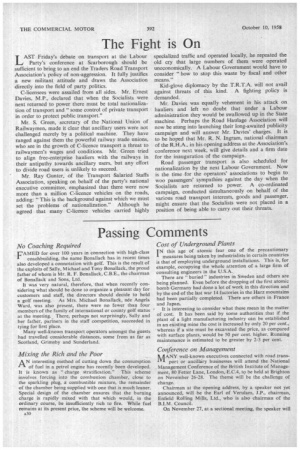The Fight is On
Page 32

If you've noticed an error in this article please click here to report it so we can fix it.
LAST Friday's debate on transport at the Labour Party's conference at Scarborough should be sufficient to bring to an end the Traders Road Transport Association's policy of non-aggression. It fully justifies a new militant attitude and draws the Association directly into the field of party politics.
C-licensees were assailed from all sides. Mr. Ernest Davies. M.P., declared that when the Socialists were next returned to power there must be total nationalization of transport and "some control of private transport in order to protect public transport."
Mr. S. Green, secretary of the National Union of Railwaymen, made it clear that ancillary users were not challenged merely by a political machine. They have ranged against them the powerful railway trade unions, who see in the growth of C-licence transport a threat to railwaymen's wages and conditions. Mr. Green tried to align free-enterprise hauliers with the railways in their antipathy towards ancillary users, but any effort to divide road users is unlikely to succeed.
Mr. Ray Gunter, of the Transport Salaried Staffs Association, speaking on behalf of the party's national executive committee, emphasized that there were now more than a million C-licence vehicles on the roads, adding: "This is the background against which we must set the problems of nationalization." Although he agreed that many C-licence vehicles carried highly specialized traffic and operated locally, he repeated the old cry that large numbers of them were operated uneconomically. A Labour Government would have to consider "how to stop this waste by fiscal and other means."
Kid-glove diplomacy by the T.R.T.A. will not avail against threats of this kind. A fighting policy is demanded.
Mr. Davies was equally vehement in his attack on hauliers and left no doubt that under a Labour administration they would be swallowed up in the State machine. Perhaps the Road Haulage Association will now be stung into launching their long-awaited publicity campaign and will answer Mr. Davies' charges. It is to be hoped that Mr. R. N. Ingram, national chairman of the R.H.A., in his opening address at the Association's conference next week, will give details and a firm date for the inauguration of the campaign.
Road passenger transport is also scheduled for nationalization by the next Labour Government. Now is the time for the operators' associations to begin to woo passengers' sympathies against the day when the Socialists are returned to power. A co-ordinated campaign, conducted simultaneously on behalf of the various road transport interests, goods and passenger, might ensure that the Socialists were not placed in a position of being able to carry out their threats.




































































































